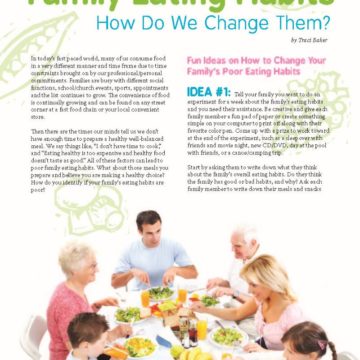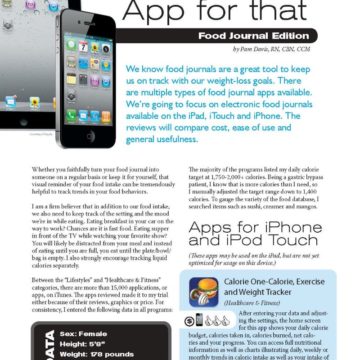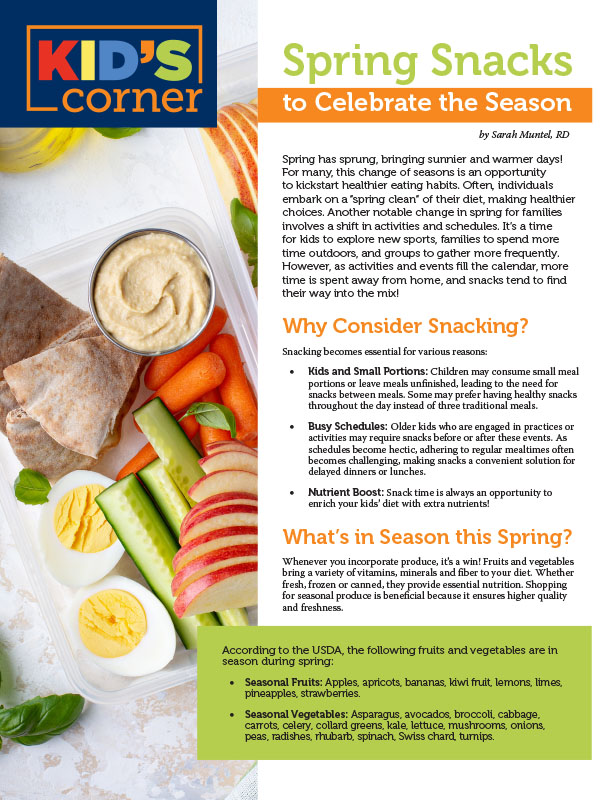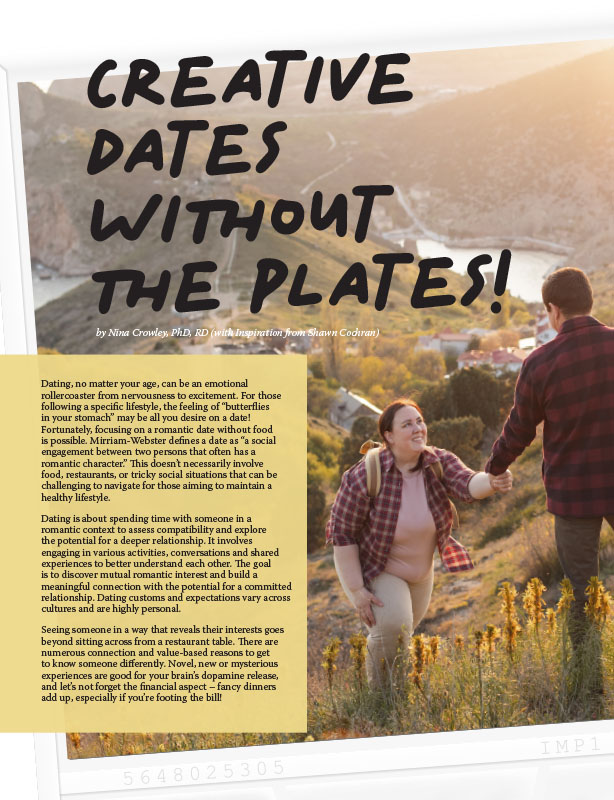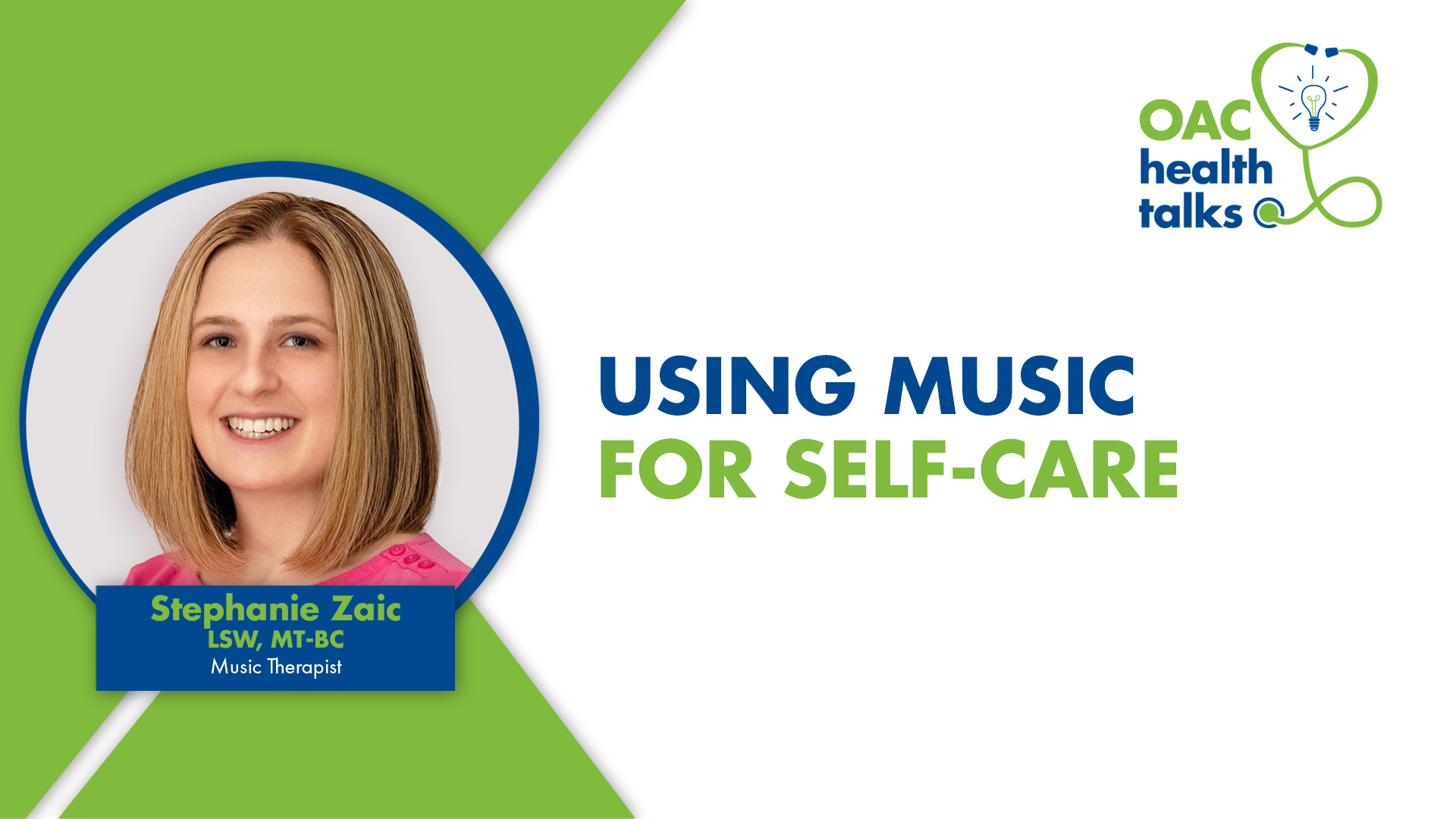Do We Eat to Live or Live to Eat

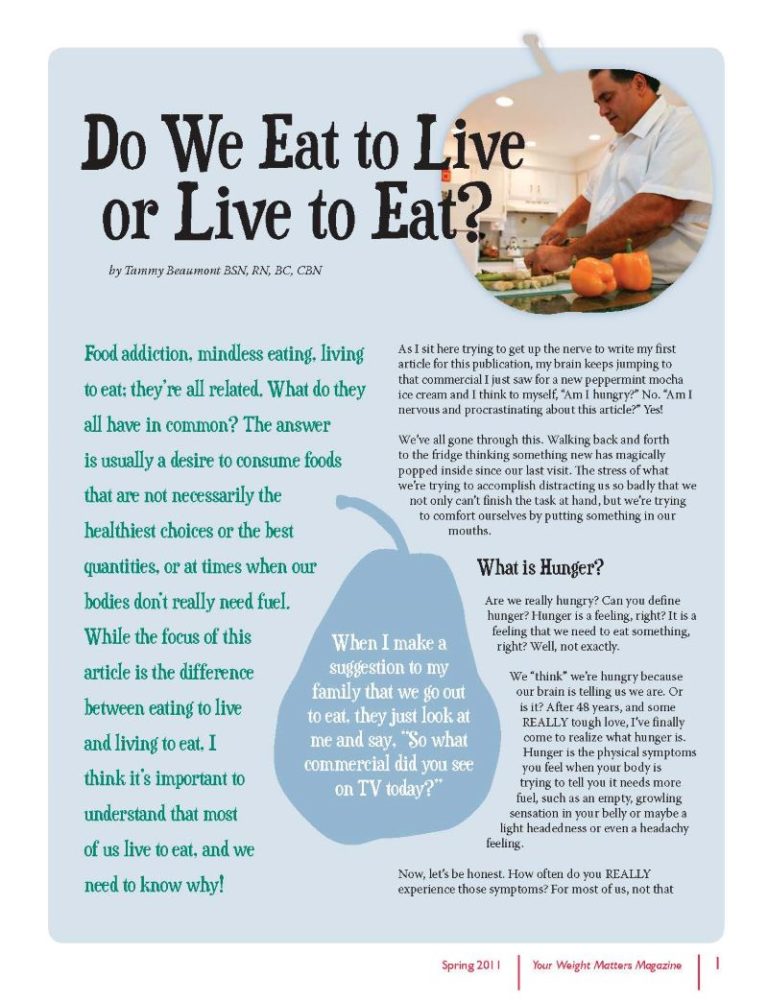
by Tammy Beaumont, BSN, RN, BC, CBN
Spring 2011
Food addiction, mindless eating, living to eat; they’re all related. What do they all have in common? The answer is usually a desire to consume foods that are not necessarily the healthiest choices or the best quantities, or at times when our bodies don’t really need fuel. While the focus of this article is the difference between eating to live and living to eat, I think it’s important to understand that most of us live to eat, and we need to know why!
As I sit here trying to get up the nerve to write my first article for this publication, my brain keeps jumping to that commercial I just saw for a new peppermint mocha ice cream and I think to myself, “Am I hungry?” No. “Am I nervous and procrastinating about this article?” Yes!
We’ve all gone through this. Walking back and forth to the fridge thinking something new has magically popped inside since our last visit. The stress of what we’re trying to accomplish distracting us so badly that we not only can’t finish the task at hand, but we’re trying to comfort ourselves by putting something in our mouths.
What is Hunger?
Are we really hungry? Can you define hunger? Hunger is a feeling, right? It is a feeling that we need to eat something, right? Well, not exactly.
We “think” we’re hungry because our brain is telling us we are. Or is it? After 48 years, and some REALLY tough love, I’ve finally come to realize what hunger is. Hunger is the physical symptoms you feel when your body is trying to tell you it needs more fuel, such as an empty, growling sensation in your belly or maybe a light headedness or even a headachy feeling.
Now, let’s be honest. How often do you REALLY experience those symptoms? For most of us, not that often. Our brains are being tricked into thinking we’re hungry because we are literally bombarded with external stimuli that make us think we’re hungry.
When I make a suggestion to my family that we go out to eat, they just look at me and say, “So what commercial did you see on TV today?”
Ever wonder why we’re drawn to the Cinnabon store at the mall? Do you think it’s a coincidence that they’re placed separately from the food court and away from other distracting sights and smells? Marketing agencies know it’s not a coincidence. They all know what most of us are unable to understand and worse, unable to control. And, they know that many of us are hardwired to react in an almost obsessive manner when taunted with visions, sounds and smells of what our brain perceives will make us happy.
I could go on and on about the science behind what makes us eat, but the bottom line is still our brain. Our body has an automatic mechanism to regulate hunger and fullness. For some reason, in those of us predisposed to weight problems, this system doesn’t function properly. We have desires to eat when we’re not physically hungry and we continue to eat when we are in reality, full.
Lifelong Learning
Seven years ago I had weight-loss surgery and lost 135 pounds. For a brief period, the time we call the “honeymoon period,” I was eating to live. It was a proverbial “light bulb moment.” I wasn’t hungry and I wasn’t tempted to constantly eat. I ate because I was taught to eat five to six small meals a day, each containing 10-15 grams of protein. Thankfully, I spent that time wisely learning for the first time in my life what food actually tasted like. Learning what portion makes me feel comfortably full vs. “Thanksgiving full.”
So why, seven years later, do I still struggle with the same demons and temptations? The answer is simple. The external stimuli are still there, and my internal coping mechanisms have never been fully converted to a healthier alternative than food. So what has made a difference? Why am I able to maintain my weight-loss?
Support and Strength in Others
I think the answer lies in self-awareness, planning for situations that put you at risk and surrounding yourself with supportive people you can reach out to. There’s a counselor named Merrill Littleberry who works with my patients. I’m privileged to call her my friend. I also call her “Vitamin M” because like vitamins, she’s good for you. You need to find that person in your life who can be your vitamin and be your sunshine.
The saying “birds of a feather flock together” couldn’t be truer when trying to cope with the unhealthy eating habits most of us have. There has been research showing that when eating with overweight people, we tend to eat more ourselves.
Our culture has led us in this direction in the same way it has led to the obesity epidemic. Daily schedules that make your head spin; fast, convenient and cheap food in order to keep up with that lifestyle; electronics and gadgets that are supposed to be time savers. But what are we doing with that extra time? Gardening? Softball? Romantic walks in the park? Heck no! We’re surfing the Internet, playing games online or watching the latest episode of our favorite television show.
Answers
So what’s the answer? How do we break out of this vicious cycle? The answer is that it’s not easy. Finding the self-awareness of what makes us tick usually requires assistance. As I’ve already said, it takes planning, and most of us need help creating that plan. You need to first figure out why you’re eating. To do that, you have to figure out what you’re eating and what caused you to eat it. It’s called old fashioned journaling, and it’s probably the number one reason most people can’t even get started on identifying, much less fixing the problem. If you don’t commit yourself to writing down every bite of food you put in your mouth, and why you’re putting it there, you’re never going to find out how to avoid those pot holes on the road to eating only to live.
People think that eating to live means giving up all your favorite foods, that you’ll never be able to enjoy a meal again. This is not true. You just look at the reason you’re eating differently. You have to find ways to cut out the unplanned, overindulgent eating. You PLAN to enjoy food.
So with that, I head off to work. Of course, I’ve already planned where I’m going out to dinner tonight – one of my favorite restaurants. My friend and I will share the six ounce filet and I’ll have a bite or two of both the loaded baked potato and the salad. Sound like deprivation to you? I don’t think so.
About the Author:
Tammy Beaumont, BSN, RN, BC, CBN, is an OAC Advisory Board Member, a registered nurse, a certified bariatric nurse and an obesity survivor who had gastric bypass surgery seven years ago and has maintained a 135 pound weight-loss. Since then she has changed the focus of her nursing career and now works with patients wanting to follow the same journey to a healthy lifestyle.
by Sarah Muntel, RD Spring 2024 Spring has sprung, bringing sunnier and warmer days! For many, this…
Read Articleby Nina Crowley, PhD, RD (with Inspiration from Shawn Cochran) Winter 2024 Dating, no matter your age,…
Read ArticleDid you know that stress can have an impact on weight? Many people increase their food intake…
View Video




